To get the most out of your favourite cup of tea, you need to prepare it right. The equipment you use, the amount of time you steep and even how hot the water gets are all factors that determine the quality of your tea. In this shopping guide, I’ll focus on the equipment, specifically tea kettles.
A lot of people heat the water using a microwave because it is fast. But microwaves don’t make the best tea. They tend to heat the water past the boiling point, causing your tea to lose some of its rich flavour. A kettle is the best way to go.
You have two choices; a stove-top kettle or an electric kettle.
I recommend an electric kettle. It is easier to use, boils more water in a shorter time and saves energy. Most importantly, it gives you fine control over the tea-making process. For instance, if you are following a recipe that specifies a specific water temperature, you can use an electric kettle with a temperature control feature.
There is another huge benefit of electric kettles for people who live in a hard water area. Many electric kettles come with a built-in filter that removes scale and other impurities such as chlorine from the water. Hard water can not only damage your appliances, it also dulls your tea or coffee flavour.
The Best Kettle For Hard Area In The UK
Below we review the best kettles for hard water areas. We considered factors like ease of use, durability and quality of tea brewed (according to users) to choose the 5 best kettles for hard water. If your kettles keep breaking down after just 1 year because of hard water or if your beverages have a slight chlorine taste, try one of these kettles.
1. Breville VKJ972 BRITA Filter Maxtra Jug Kettle
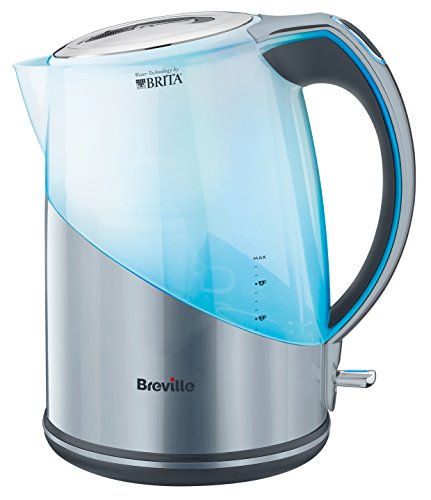
This is one of the best kettles for hard water areas. It comes with an integrated filter that eliminates impurities in the water. So you only get clean pure water for your tea or coffee. The filtration cartridge needs replacement after a while. An electric indicator on the kettle will alert you when it is time to buy a new one. The kettle has a curved modern design that looks good in any kitchen countertop. It has a silver base and a large window that lights up in blue when your water is ready. With its 1-litre capacity – which comes to around 7 cups – it can easily serve a large family or a group of friends.
What we like about it:
- Ideal for hard water areas.
- Easy to use.
- Great design.
2. Andrew James Fast Boil Glass Kettle
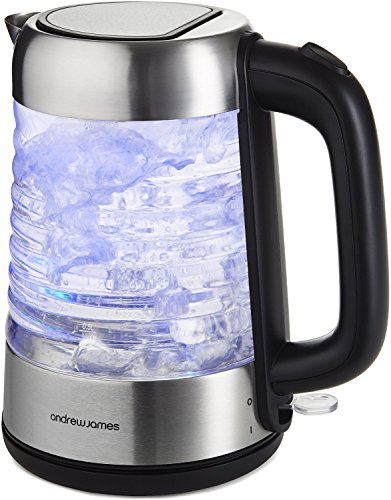
If you need a bigger kettle, try this one. It has a 1.7-litre capacity, plenty enough to fill a large mug of tea or serve your guests. You can even use it in a small office. To handle hard water, it comes with a removable scale filter. This makes it easy to remove the filter for cleaning, thus ensuring your water remains clean and pure. The jug itself is made from a type of extra-hardy glass that easily stands up to hard water and heat. You can expect it to last for many years. It’s pretty easy to use. The lid flips to a 90-degree angle, making it easy to refill the kettle from the tap. The kettle will illuminate blue when the water comes to a boil. When you are done, it’s easy to lift it from the 360-degree swivel base. There is even a compartment to neatly tuck away the cord.
What we like about it:
- Removable filter for easy cleaning.
- Large capacity.
- Heats water quickly.
3. Breville VKT071 Glass Kettle
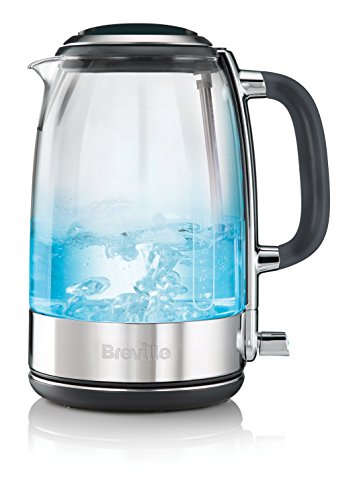
This is another high-capacity kettle perfect for families living in hard water areas. It has an integrated filter to filter out scale and impurities from the water. Even better, the filter is removable. This means you can easily wash the filtered scale off it. The kettle has a beautiful dome design with a 360-degree swivel base that allows you to lift the jug with either your left or right hand. The body is made from crystal clear Schott Duran glass, a tough and long-lasting type of glass. It easily resists heat and mineral build-up. When the water boils, the glass gives off a sleek blue light.
What we like about it:
- Removable scale filter.
- Can be used by both right and left handed users thanks to the 360-degree base.
- High capacity.
4. Philips HD9340/90 Glass Kettle
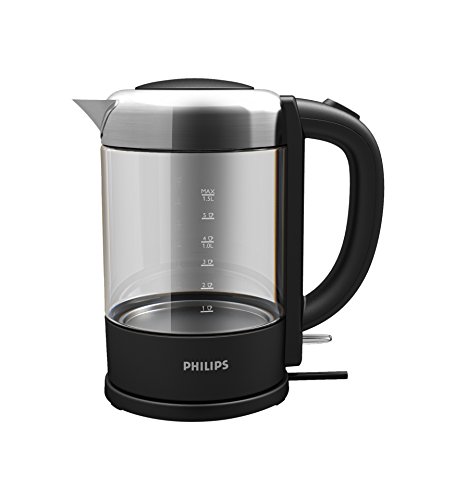
An anti-calc filter allows you to use hard water without affecting the taste of your beverages or damaging your kettle. You don’t have to worry about constantly scrapping scale off the inside of the kettle. The kettle uses a 360-degree base with a flat heating element that boils water faster. A pilot switch tells you when the kettle is on. It automatically turns off when the water boils or when you lift the jug from the base. For easy use, the jug has one cup indicators. You can brew exactly one cup, two cups and so on up to 5 cups.
What we like about it:
- Integrated filter to keep scale out of your water and kettle.
- Easy to use.
- Safety features to prevent short circuiting and dry-boiling.
5. Russell Hobbs Plastic Brita Filter Purity Kettle 22851
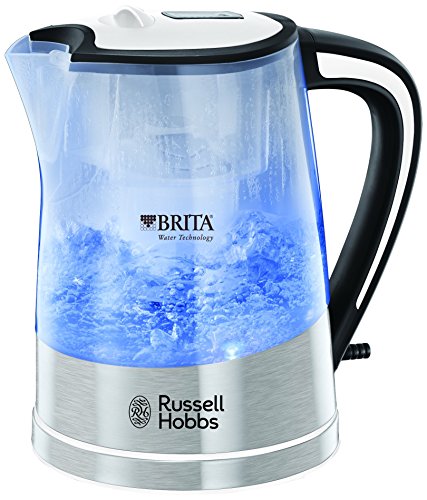
This 1-litre kettle comes with a removable filter cartridge that’s easy to wash. There is a reminder feature that will alert you when it’s time to buy a new cartridge. To save money, you can buy the kettle bundled with 4 filters or 6 filters. The filter removes scale and chlorine from water to ensure your beverages retain their full flavour. It also ensures that the kettle lasts long. The kettle is easy to use. There are cup indicators so that you can boil only the amount you need to save energy and time. As the water boils, an LED indicator turns blue, telling you that the water is ready. It’s easy to lift the jug from the 360-degree base and pour the water into a cup.
What we like about it:
- Removable and washable filter with replacement reminder.
- Cup indicators.
- Easy to use.
Frequently Asked Questions
Q: How do you remove limescale from a kettle?
A: From filling up hot water bottles to making tea and coffee, kettles are an integral part of our mornings.
Unfortunately, the inside of your kettle tends to get furred up overtime with a hard yellowish mineral known as limescale. This furring not only slows down the heating process, but also contaminates your hot water with floating scales and flakes.
To remove the limescale deposits, you’ll need a simple solution of mild acid. The most commonly used solution is white vinegar. However, lemon juice or cola will work just fine (cola works for everything).
Proceed to fill the kettle with equal parts water and vinegar, then let it soak for an hour. Next, boil the solution in the kettle.
Let the hot water sit in there for half an hour before pouring it out and rinsing thoroughly. If there’s still some stubborn limescale deposits remaining, use a greater ratio of vinegar to water.
Q: Is Calcium buildup in kettles harmful?
A: Also known as limescale, calcium carbonate is a sedimentary deposit left inside your kettle when hard water evaporates.
From the previous question, we’ve seen that calcium deposits bring about certain disadvantages. For one, the heating process becomes much slower. Secondly, the limescale flakes are left floating around in the water spoiling an otherwise perfect cuppa.
So while there’s no evidence that the calcium is bad for your health, it’s certainly harmful to your kettle. If left to accumulate for too long without any cleaning, calcium carbonate can become an appliance killer.
The buildup blocks small spaces, damages electrical components, corrodes sensitive elements, and finally kills your kettle in cold blood… water.
Q: How often should you descale your kettle?
A: Descaling your kettle comes with an array of benefits. Not only does it keep the inside of your kettle clean and spotless, it also reduces heating delays for water saving you both time and energy.
What’s more, a thorough cleansing helps extend the lifetime of your kettle substantially. You can follow the process in the question above for descaling your kettle with white vinegar.
Regularly descaling your kettle will help you limit the risk of premature breakdowns. If you use your kettle regularly (i.e. 2 to 5 times a day), then make sure you follow the recommended descaling frequency.
Experts recommend descaling once every 3 months if you use soft water and once a month if you live in an area with hard water.





I have a daewoo sda1207 I use brita filtered water but need to descale weekly due to build up on heating platform and first inch up the glass